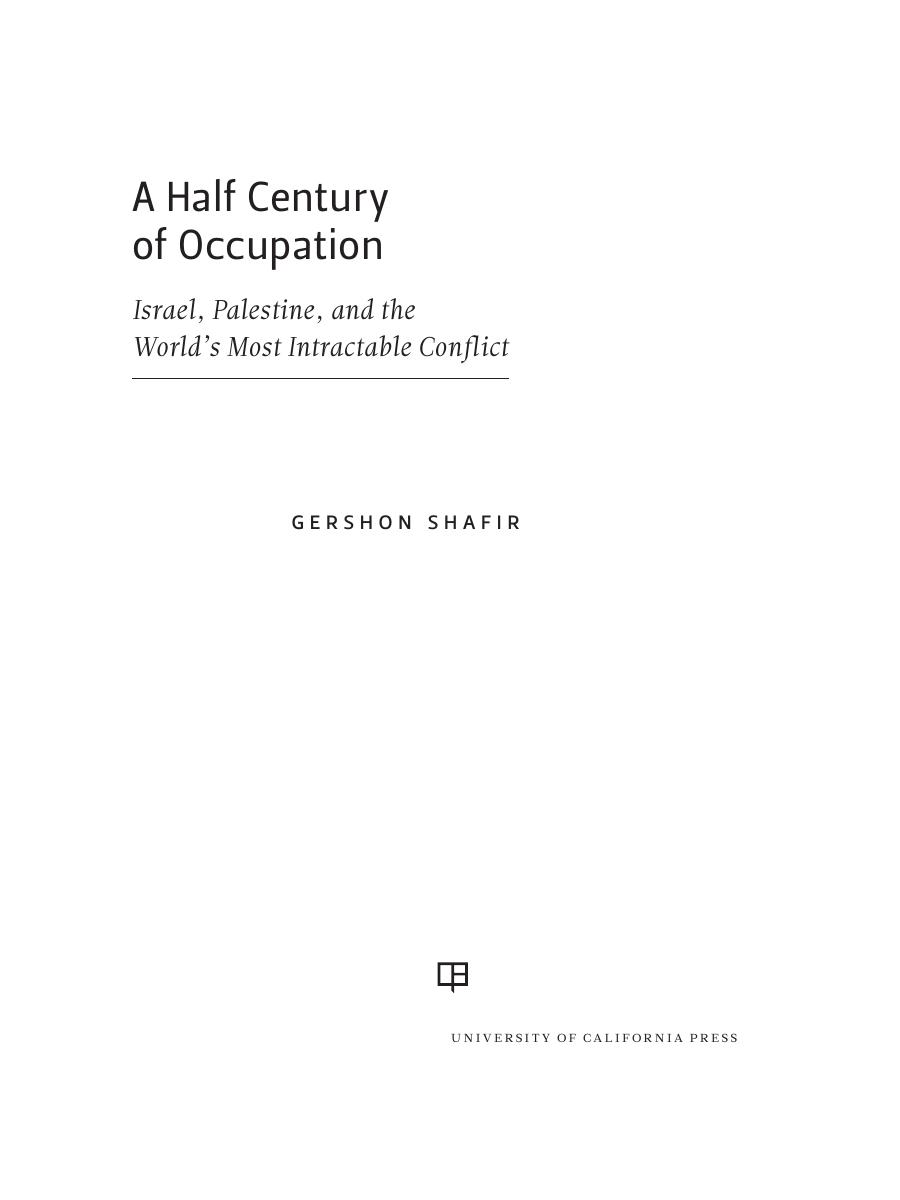A Half Century of Occupation: Israel, Palestine, and the World's Most Intractable Conflict by Gershon Shafir

Author:Gershon Shafir [Shafir, Gershon]
Language: eng
Format: epub, pdf
Tags: History, Middle East, Israel & Palestine
ISBN: 9780520293502
Google: 8uM6DgAAQBAJ
Publisher: Univ of California Press
Published: 2017-01-15T00:49:53.984000+00:00
VIII
The religious vanguards in Israeli and Palestinian societies have appeared against the background of, and filled in the gap left by, the ineffectiveness of the international community and IHL to push Israel forcefully for a concluding agreement along two-state parameters. Indeed, the last two forces that have prolonged the occupation are the direct enabling role played by US foreign policy and the indirect enabling leverage provided by IHL. Growing Israeli intransigence, indeed hubris, rides on the increasingly pro-Israeli US foreign policy under successive administrations since 1967. The United States transitioned from a position of relative neutrality—to the point of forcing Israel to withdraw from the Sinai in 1957, and remaining ambiguous with regard to the Israeli decision to launch the 1967 War—to one of unbending support since the early 1970s.
The growth and acceleration of the pro-Israeli stance in American foreign policy have two main sources—international and domestic—and the nature of US-Israeli relations at any given time is determined by their balance. The former is an expression of national security considerations, while the latter is articulated in the form of a “special relationship.” So-called special relationships are a goody bag commonly filled with ill-defined and amorphous benefits that have been repeatedly added and subtracted over time. Though by their very definition special relationships should remain immune to the vagaries of crass interests, the record suggests that the specialness of the US-Israeli relations has been contingent on the salience and interpretation of US national security interests. In this section, I will survey the history of political and military ties between the two countries and will then turn to the evolution of their symbolic dimension in order to assess the role played by the United States in prolonging the Israeli occupation.
Though under President Truman the United States was the first country to recognize the newly declared state of Israel in May 1948, it trailed the USSR in recognizing Israel de jure. For most of Truman’s and Eisenhower’s administrations, Israel was viewed as “a major political and security liability,” to borrow the words of the political scientist Robert O. Freedman.64 Israeli-US relations thus began at a low point. The United States did not wish to support a new state that it expected to be defeated in the 1948 War. And if Israel survived it would be even less welcome, since US diplomats anticipated either that it would become a Soviet client state or that support for Israel would drive the Arab states to become Soviet clients. The United States, consequently, imposed an arms embargo on both sides. Following the war, the United States demanded that Israel allow the return of Palestinian refugees and cede a land corridor between Egypt and Jordan but was rebuffed on both counts. The Israeli military procured its arms and equipment from the Soviet bloc in the 1948 War and from France in the Suez War of 1956. Eisenhower condemned the French-British-Israeli invasion and compelled Israel to withdraw from the Sinai. In contrast to the lukewarm US support afforded Israel,
Download
A Half Century of Occupation: Israel, Palestine, and the World's Most Intractable Conflict by Gershon Shafir.pdf
This site does not store any files on its server. We only index and link to content provided by other sites. Please contact the content providers to delete copyright contents if any and email us, we'll remove relevant links or contents immediately.
| Africa | Americas |
| Arctic & Antarctica | Asia |
| Australia & Oceania | Europe |
| Middle East | Russia |
| United States | World |
| Ancient Civilizations | Military |
| Historical Study & Educational Resources |
Empire of the Sikhs by Patwant Singh(23074)
The Wind in My Hair by Masih Alinejad(5092)
Rise and Kill First by Ronen Bergman(4780)
The Templars by Dan Jones(4682)
The Rape of Nanking by Iris Chang(4203)
12 Strong by Doug Stanton(3541)
Blood and Sand by Alex Von Tunzelmann(3195)
Babylon's Ark by Lawrence Anthony(2673)
The History of Jihad: From Muhammad to ISIS by Spencer Robert(2621)
No Room for Small Dreams by Shimon Peres(2365)
The Turkish Psychedelic Explosion by Daniel Spicer(2355)
Inside the Middle East by Avi Melamed(2352)
Gideon's Spies: The Secret History of the Mossad by Gordon Thomas(2346)
Arabs by Eugene Rogan(2292)
The First Muslim The Story of Muhammad by Lesley Hazleton(2268)
Come, Tell Me How You Live by Mallowan Agatha Christie(2255)
Bus on Jaffa Road by Mike Kelly(2150)
Kabul 1841-42: Battle Story by Edmund Yorke(2025)
1453 by Roger Crowley(2023)
